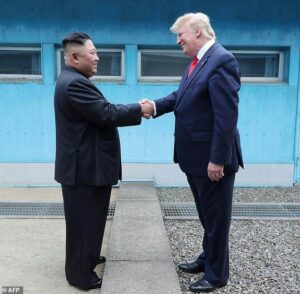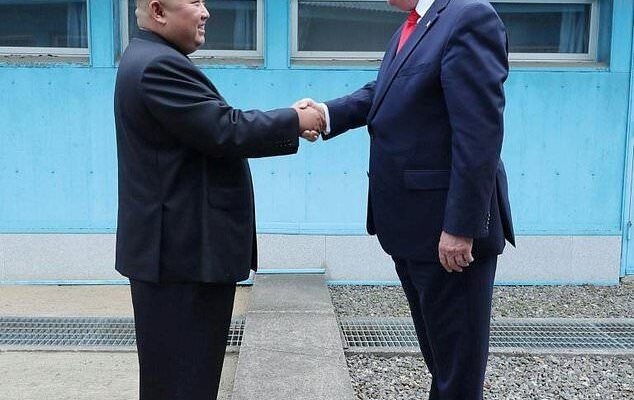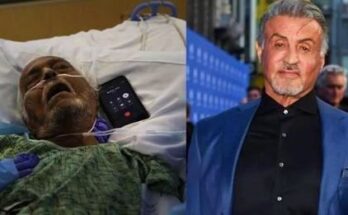
- North Korea said that Trump and Kim’s meeting at the DMZ Sunday was ‘historic’
- The impromptu meeting was set in motion after Trump tweeted an invitation to meet on Saturday
- Trump an
 d Kim shook hands over the concrete slabs dividing North and South Korea before Trump walked a few paces into Pyongyang’s territory
d Kim shook hands over the concrete slabs dividing North and South Korea before Trump walked a few paces into Pyongyang’s territory - He became the first serving US president ever to set foot on North Korean soil
North Korea on Monday hailed the weekend meeting between leader Kim Jong Un and US President Donald Trump in the Demilitarized Zone as ‘historic’, as analysts said Pyongyang was looking to shape the narrative to its own agenda.
The two leaders agreed to ‘resume and push forward productive dialogues for making a new breakthrough in the denuclearisation of the Korean peninsula’, the official Korean Central News Agency said.
After a Twitter invitation by the US president on Saturday, the two men met a day later in the strip of land that has divided the peninsula for 66 years since the end of the Korean War, when the two countries and their allies fought each other to a standstill.


Kim and Trump shook hands over the concrete slabs dividing North and South before Trump walked a few paces into Pyongyang’s territory — the first US president ever to set foot on North Korean soil.
‘The top leaders of the DPRK and the US exchanging historic handshakes at Panmunjom’ was an ‘amazing event’, KCNA said, describing the truce village as a ‘place that had been known as the symbol of division’ and referring to past ‘inglorious relations’ between the countries.
The meeting took place ‘at the suggestion of Trump’, it added.
The impromptu meeting in the DMZ – where the US president said they agreed to resume working-level talks within weeks on the North’s nuclear programme – was full of symbolism.
Trump’s border-crossing – which he said was uncertain until the last moment – was an extraordinary sequel to the scene at Kim’s first summit with Moon Jae-in last year, when the young leader invited the South Korean president to walk over the Military Demarcation Line, as the border is officially known.
‘It was an honour that you asked me to step over that line, and I was proud to step over the line,’ Trump told Kim.


KCNA described it as a ‘historic moment’, marking the ‘first time in history’ a sitting US president set foot on North Korean soil.
Pictures from the meeting — including a sequence of images from the two men emerging from opposite sides for a handshake and a skip across the border — were splashed across the front page of the official Rodong Sinmun newspaper, which carried 35 images in total.
Shin Beom-chul, an analyst at the Asan Institute of Policy Studies, said the KCNA report was ‘typical North Korean propaganda that glorified Kim as leading the tremendous changes in geopolitics’.
‘The objective was to recover Kim’s damaged status after he returned from the Hanoi summit empty-handed,’ Shin added.
Analysts have been divided on Sunday’s events, some saying they spurred new momentum into deadlocked nuclear talks, while others described them as ‘reality show theatrics’.




The first Trump-Kim summit took place in a blaze of publicity in Singapore last year but produced only a vaguely worded pledge about denuclearisation.
A second meeting in Vietnam in February collapsed after the pair failed to reach an agreement over sanctions relief and what the North was willing to give in return.
Contact between the two sides has since been minimal – with Pyongyang issuing frequent criticisms of the US position – but the two leaders exchanged a series of letters before Trump issued his offer to meet at the DMZ.
As well as the working-level talks, Trump also floated the idea of sanctions relief – repeatedly demanded by Pyongyang – and said he invited the North Korean leader to the White House.
Such a trip would have to come ‘at the right time’, he added.
KCNA was less specific, saying Kim and Trump discussed ‘issues of mutual concern and interest which become a stumbling block’.
Trump regularly calls Kim a ‘friend’ and KCNA cited the North Korean leader as lauding their ‘good personal relations’, saying they would ‘produce good results unpredictable by others and work as a mysterious force overcoming manifold difficulties and obstacles’.
Vipin Narang of the Massachusetts Institute of Technology said the North was portraying Kim as ‘being courted by Trump’.
‘Note very carefully the sequence of issues here,’ he said on Twitter. ‘Easing tensions, ending inglorious relations, and then working on denuclearization of the Korean Peninsula (again, not just North Korea).
‘Kim is still not offering to unilaterally disarm.’
On Sunday, during a joint news conference with South Korea’s president Moon Jae-in, Trump drew backlash from President Obama’s staffers, after claiming that Kim had refused to meet with Obama.
‘President Obama wanted to meet, and Chairman Kim would not meet him,’ Trump said during the press conference. ‘The Obama administration was begging for a meeting. They were begging for meetings constantly. And Chairman Kim would not meet with him.’
Trump’s statement was proven to be untrue as while Obama came into his presidency saying he’d be willing to meet with North Korea’s Kim Jong Un and other U.S. adversaries ‘without preconditions,’ he never publicly sought a meeting with Kim.
Obama eventually met Cuba’s President Raul Castro and spoke to Iranian President Hassan Rouhani by phone but took a different stance with Kim in 2009 as North Korea was escalating missile and nuclear tests.
‘This is the same kind of pattern that we saw his father engage in, and his grandfather before that,’ Obama said in 2013. ‘Since I came into office, the one thing I was clear about was, we’re not going to reward this kind of provocative behavior. You don’t get to bang your – your spoon on the table and somehow you get your way.’
Ben Rhodes, who was on Obama’s national security team for both terms, tweeted: ‘Obama never sought a meeting with Kim Jong Un.’
Trump has portrayed his diplomacy with Kim as happening due to a special personal chemistry and friendship, saying he’s in ‘no rush’ to get Kim to commit fully to denuclearization.






